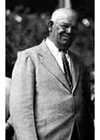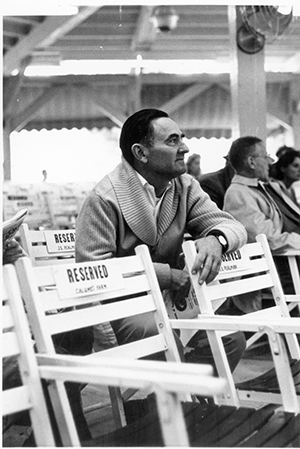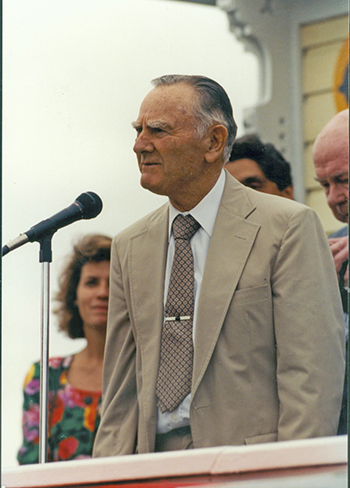The charm of horse racing lies primarily in the animals that do
it—their beauty, grace, power and their degree of class. But there is an
undeniable attraction to the colorful human beings that make it happen.
The purpose of this blog is to share my stories about some of these
characters. My requisites in the selection: I had dealings with them,
their antics and accomplishments should not be forgotten, and that at least most of them are
no longer with us. — Cot Campbell
Virgil W. "Buddy" Raines was the consummate horseman, a wonderful human being, and one of the most uncomplicated, evenly balanced persons God ever let live.
He botched a splendid opportunity to be neurotic. You see, no one ever told him he had a right to be.
Buddy was one of seven children in a poor family. One day an itinerant horse trainer was traveling through Wayne, Ill., and, in keeping with the neighborliness of the times, was invited to have a meal with the Raines family.
At supper he looked around the table, admired the young manpower sitting there, and said, "Man, I wish I had me a strong little boy to help out with my horses!"
Mr. Raines, keenly cognizant of having an excess number of mouths to feed in times that were hard, said, "Well, hell, take that one," pointing unmistakably at Buddy.
He did, putting Buddy straight to work in what would be the beginning of 80 years in the horse business. After several years as virtually an indentured child servant, Buddy was traded to another horseman. That fellow kept him, worked him, and then "gave" him to a man who was to play a significant part in the boy's development.
This was Whistling Bob Smith, who at that time was the trainer of the powerful Brookmeade Stable of Isabel Dodge Sloane.

Hall of Fame Trainer
Whistling Bob Smith
Buddy primarily galloped horses for him and later began riding races on the flat and over jumps.
Whistling Bob Smith (so called because of a usually sunny disposition) had a wife who was very kind. She liked Buddy and was the first to be concerned that whatever education Buddy had received thus far had come from life on the racetrack. She insisted that Buddy—age 16 and doing pretty well financially as a jockey apprenticed to the Brookmeade outfit—be enrolled in school. The schooling could be fitted into his daily barn and racetrack responsibilities.
So enroll he did. Trouble was the young man was shaving every day but his educational background was that of a 6-year-old. Buddy Raines had to start out with first grade.
Someone once asked him, "Buddy, wasn't that awfully embarrassing to be in class with all those little kids?"
"Hell no! I was the only sumbitch in the first grade that drove a Pierce Arrow to school!"
Buddy was a perfect example of how the worldliness of the racetrack can turn an ignorant person from humble origins into a relative sophisticate.
Buddy socialized as an equal with giants of industry; he traveled abroad with one of his adoring patrons, Donald Ross; columns were written about him by such as the renowned Red Smith; the legendary chairman of the Coca-Cola Co., Robert W. Woodruff, was delighted by him and once named one of his bird dogs "Buddy Raines."

Buddy Raines at Saratoga in 1962
Buddy wore clothes that would have pleased Cary Grant. He never knew a stranger, was easy with any man or woman from the loftiest station in life, had impeccable manners, was an engaging conversationalist, and most important of all, he was comfortable and happy in his own skin.
His would surely have been a less captivating story had he not been "given" to that horse trainer who stopped for a meal.
Some of Buddy's unpredictable savoir-faire brushed off from Whistling Bob, but certainly not all of it. Mr. Smith had some rather startling gaps in his urbanity. He retained a fierce addiction to The Lone Ranger, a popular radio serial of the '30s and '40s featuring a phenomenally benevolent masked cowboy and his faithful companion, a steadfast and taciturn Indian named Tonto.
Each day just before 4:30 in the afternoon, Whistling Bob would surreptitiously dart into the tack room, shut the door, and then emerge 30 minutes later, flushed with excitement. Bob may have been the oldest member of The Lone Ranger Fan Club, but by no means was his dedication lacking.
All the help knew what he was doing, but they tactfully refrained from discussing this topic with the big boss.
When Brookmeade ran a horse in a stake (which, of course, it frequently did), the late afternoon timing of this featured race unfortunately would conflict with the Lone Ranger episode of that day. One surmises that on these occasions, Whistling Bob opted for the paddock and saddling duties and not for his Philco. Perhaps he knew some 10-year-old fellow fan who could re-create that day's adventures for him.
One day Buddy's boss left the shed row and popped into the tack room for his daily fix.
At five o'clock, just as the last strains of "Hi-Yo Silver!—Away!" were dissipating into the ether, Bob threw open the door and yelled in complete disgust, "Who do those jokers think they're kidding!"
"What's the matter, boss?" Buddy rushed up and asked solicitously.
With a wild look in this eye, Bob Smith exclaimed, "This is crazy! Get this: The Lone Ranger is holed up in a canyon. He's in a helluva gunfight with some rustlers. So he sends a smoke signal to Tonto, who has got to be at least a mile away. No more than one minute later that son of a bitch rides up to help! There's no way in the world he could have got there that fast. Man, I don't know what they're trying to pull!"
In addition to The Lone Ranger, Whistling Bob also was a devoted backer of his horses. If he had one ready and the odds were right, he would shove the shekels through the windows with both hands.
Once, in later years, when that great outfit had long since won the Kentucky Derby with Cavalcade, the Belmont with High Quest, and Buddy was still assistant trainer, the old trainer was struck down with a grave illness.
Bob lay seemingly comatose in his hospital room. One afternoon during rounds, his doctor entered the room. A family member asked him about Bob's chances.
The doctor, under the impression that Smith was unconscious, walked the visitor over to the corner of the room and answered, "Truthfully, it's about 10-1 against his survival."
The 10-1 registered with Whistling Bob. His eyes popped open, and he rasped, "Say, Doc, that's too good a price to pass up. Just reach in my pants pocket and get out a ten-dollar bill. I'll take that bet for a sawbuck!"
Buddy Raines was a very popular man. I doubt that he ever had an enemy. But, in the words of Red Smith, he was "an enemy of silence." He had a thousand great stories and he would tell them.
In between times, he played a role in the careers of many a great racehorse. Among them Cavalcade, Open Fire, Cochise, Timely Warning, Greek Song and Greek Money.

Buddy Raines, shown here at Pimlico in 1990, trained three consecutive winners
of the Maryland Million Classic, 1989-1991; first with Master Speaker and
then back-to-back with Timely Warning
More of Cot Campbell's stories are included, among a host of others, in The Best of Talkin' Horses.




